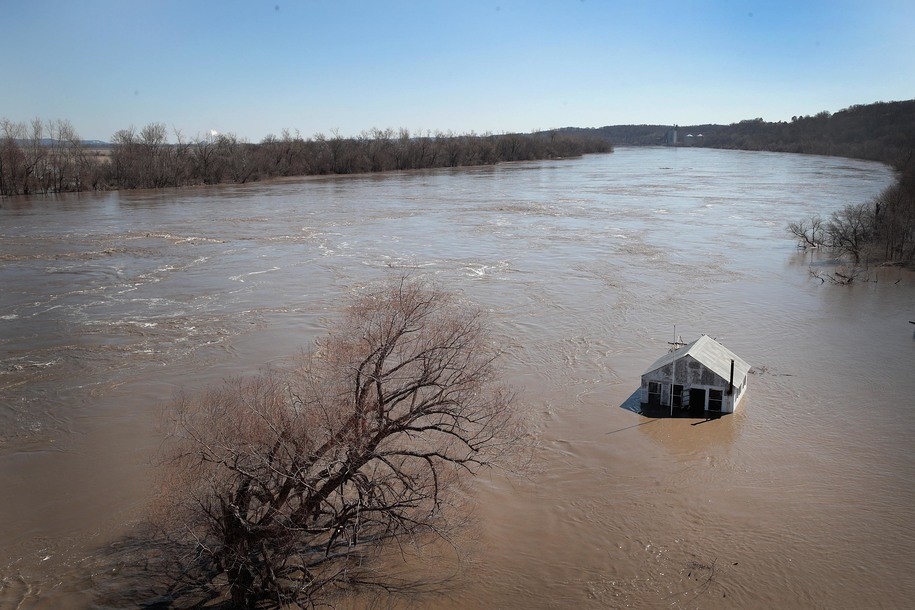This past week has seen flood waters surge over Offutt Air Force Base in Nebraska. As NBC News reports, Offutt is home to the U.S. Strategic Command that overseas America’s nuclear strike capabilities. Even so, a third of the base is currently underwater as floods spawned in the wake of a record “bomb cyclone” have caused damage that ranges into the millions, if not billions. Three thousand airmen normally stationed at Offutt are currently climate refugees, displaced from their homes by floodwaters. Events at Offutt follow massive destruction in 2018 at Tyndall Air Force Base in Florida after Hurricane Michael destroyed or damaged every single structure on the base, as well as F-22 fighters that weren’t moved away from the base in time.
But as the military is failing to move fast enough to address the changes being brought on by climate change, Trump is in the middle of creating a panel explicitly designed to bring all planning to a halt. As CNN reported, the entire purpose of the panel is to remove the obligations that the government currently has to plan for climate change stemming from legislation passed in 1990. Twenty-nine years ago, the Global Change Research Program established the need for federal agencies to produce an assessment of climate change, and plan for how to address its impact. That assessment came out last fall, but Trump dismissed the results, claiming that he “has a natural instinct for science.” He and his officials are actively working not just to ignore the report, but to roll back climate change preparations already being made.
Among those agencies that are supposed to react to the climate change assessment are the Department of Agriculture and programs covering everything from farm loans to flood prevention. That is not happening. And it’s not just Trump driving the disaster. Republican governors have ordered states to deliberately ignore the prospect of climate change in planning for infrastructure, zoning, and construction. Florida went so far to outlaw the use of the term as well as remove any effects of climate change from state planning. Republican legislators have even tried to make it illegal to report on rising sea levels.
In Nebraska, the farmers being hit by the floods might look to Trump for the cause of falling commodity prices, but they don’t have to look any further than Lincoln—as in Lincoln, Nebraska—for reasons why this year’s flood hit them unprepared. As Norfolk, Nebraska-based WJAG reported in February, Nebraska has suffered from a series of record floods, a major drought, and gigantic wildfires over the last ten years, but it is one of seven states in the Midwest that have completely refused to create a plan for dealing with climate change. Republicans killed the last bill introduced to create such a plan in 2017, as the party remains dedicated to ignoring the effects of climate change—even if it means literally holding its nose.
University of Wisconsin-Madison agriculture Professor Steven Deller notes that that the industry, and farmers, are used to a market that moves up and down. But the intersection of Trump’s trade war and failing to make necessary changes to address a radically different climate is creating a situation as destructive as the storms that have ravaged the center of the country. “Farmers are structured to ride these waves out, but when the waves are this long they can’t ride that out,” Deller said.
As the flooding moves downstream into Iowa and Missouri, farmers in those areas can be reassured that their states … have also not created a plan. However, Missouri did take action on climate change: It joined a federal lawsuit challenging the Clean Power Plan to ensure that it did not have to take any steps to address the problem. Climate change is not only here, not only ripping apart cities and farms across America, but the legislation passed at both state and federal levels is directly impacting how the results of that change are felt.
Floodwaters are now rolling through farms whose cash reserves have been destroyed by the trade war, and there are no programs in place to help them recover from levels of flooding that have never been previously recorded. Banks have already tightened their requirements and are looking ahead at a year in which overseas commodity prices are likely to remain low. Farmers are left with empty pockets and nowhere to turn.
Farms filing for bankruptcy rose by 19 percent in 2018 to the highest level since the 1980s. That was before the floods. In the wake of the ebbing waters, what’s likely to be revealed is a lot fewer working farms, and a great deal more signs advertising bankruptcy sales.

